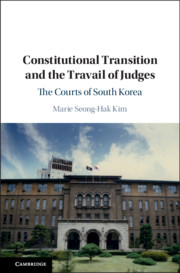Book contents
- Constitutional Transition and the Travail of Judges
- Constitutional Transition and the Travail of Judges
- Copyright page
- Dedication
- Contents
- Figures
- Tables
- Preface
- 1 Introduction
- 2 The Making of the Constitution and the Courts, 1945–1962
- 3 Jurisprudential Evolution, 1962–1972
- 4 The Yusin Era, 1972–1980 (1): The Laws
- 5 The Yusin Era, 1972–1980 (2): The Courts
- 6 The Yusin Era, 1972–1980 (3): The Judges
- 7 Political Transitions and Rule of Law, 1980–1987
- 8 Democracy and Travails of Judges, 1987 to the Present
- 9 Conclusion
- Bibliography
- Index
2 - The Making of the Constitution and the Courts, 1945–1962
Published online by Cambridge University Press: 23 July 2019
- Constitutional Transition and the Travail of Judges
- Constitutional Transition and the Travail of Judges
- Copyright page
- Dedication
- Contents
- Figures
- Tables
- Preface
- 1 Introduction
- 2 The Making of the Constitution and the Courts, 1945–1962
- 3 Jurisprudential Evolution, 1962–1972
- 4 The Yusin Era, 1972–1980 (1): The Laws
- 5 The Yusin Era, 1972–1980 (2): The Courts
- 6 The Yusin Era, 1972–1980 (3): The Judges
- 7 Political Transitions and Rule of Law, 1980–1987
- 8 Democracy and Travails of Judges, 1987 to the Present
- 9 Conclusion
- Bibliography
- Index
Summary
This chapter surveys the evolution of the courts and the constitutional system during the First and the Second Republics between 1948 and 1962. The promulgation of the Constitution of 1948 was an embodiment of the popular aspirations for liberal democracy, distilled during the three years of the US military occupation following independence fromJapanese colonial rule in 1945. Three main elements that influenced the nature and direction of the nascent Korean judiciary were legal tradition, colonial memory, and national security. An important facet of Korea’s legal culture, dating from the Choson dynasty and continuing in the colonial period, was faithful adherence to the law texts and judicial deference to the political branches. The Kyonghyang Sinmun case of 1959–1960 deals with the relationship among various sources of law in the nascent republic and the development of judicial review.
Keywords
Information
- Type
- Chapter
- Information
- Constitutional Transition and the Travail of JudgesThe Courts of South Korea, pp. 18 - 56Publisher: Cambridge University PressPrint publication year: 2019
